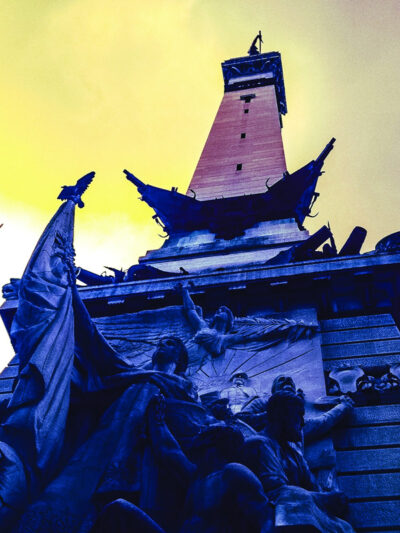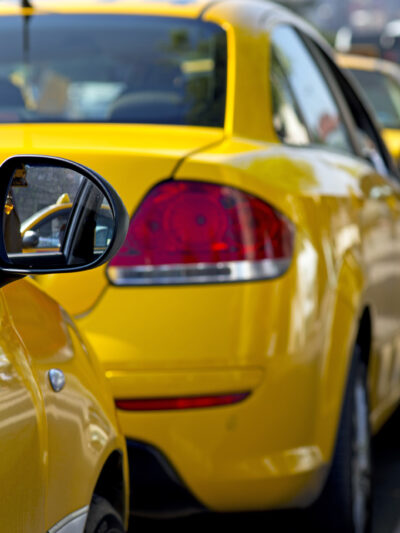News & Commentary
May 05, 2014
Free expression on public property
Eric Smith, of Lebanon, Ind., came to the Soldiers and Sailors Monument in downtown Indianapolis in July 2012 to express his opposition to the United Nations Arms Trade Treaty, which he believed threatened his Second Amendment rights.

May 05, 2014
Residential canvassers have free speech rights
Through door-to-door democracy, the Indiana affiliate of the Citizens Action Coalition (CAC) has been able to advocate effectively for nearly four decades on behalf of Hoosiers. CAC canvassers go from house to house in residential neighborhoods during the evening hours to educate citizens and gather petition signatures on issues such as utility rates and regulations, health care, and the environment.

Apr 26, 2014
The gift of Larry Reuben
In 1970, when Larry Reuben first started "hanging out at the ICLU," he was a law student at Indiana University. In 1972, Larry graduated and set up practice not far from the Thomas Building on East Washington Street in Indianapolis, where the Indiana Civil Liberties Union, as it was then known, was located.

Mar 16, 2014
Using public spaces to protest
Wanting to educate the public about the fine details of the federal healthcare law, attorney David Kolhoff contacted the Allen County Public Library about setting up his laptop on a mobile cart in a large open plaza abutting the library.

Mar 03, 2014
The girl who wanted to play football
Any student at Winamac Community Middle School who wanted to join the football team was allowed to play „ unless that student was a girl. So when "C.B.," a seventh grader at the school, and her Dad asked the principal and the athletic director if she could join the previously all-male football team, she was turned away.

Feb 19, 2014
Cabbies win lawsuite against Town of Speedway
Race weekend in Indianapolis is full of special traditions for the hundreds of thousands of spectators who gather in Speedway, Ind. It also is a lucrative weekend for taxi drivers, who shuttle people to and from the crowded Speedway track. However, in May 2013, as many as 80 cab drivers had their licenses seized on race day, according to the Speedway Police Department

Jan 03, 2014
We stopped them from passing drug testing for welfare recipients
In the 2014 legislative session, Indiana lawmakers once again attempted to pass a bill requiring drug testing for people who need public assistance for food and shelter. Fortunately, with your help, this legislation was defeated for the third consecutive session.

Jan 02, 2014
Public funds cannot support parochial endeavors
When the Saint Joseph Regional Medical Center decided to vacate its 21-acre site in downtown South Bend, Ind., St. Joseph's High School was the only prospect to step forward with solid interest in acquiring the site. The school wanted to build a new high school on the property with athletic facilities including a football field. In order to do that, the school also wanted to purchase an adjacent property, which was home to a Family Dollar store, but was unable to negotiate that purchase. In June 2011, the City of South Bend approved a plan to use $1.2 million in taxpayer funds to purchase the Family Dollar property with the sole intention of transferring the land to the Catholic Diocese, which operates the school, for $1.

Jan 02, 2014
Supreme CourtÍs ruling on roadblocks defined privacy in the 21st Century
During the 1990s police agencies became more aggressive in fighting the war on drugs, which often resulted in threats to individual liberties. In 1998, the Indianapolis Police Department began conducting traffic roadblocks to search for illegal drugs. The city set up checkpoints in neighborhoods with high crime statistics and used dogs to sniff out which cars they would stop to search for drugs. By the time the Indiana Civil Liberties Union (ICLU) won an appeal of a case in federal court on behalf of two men who were searched at a checkpoint, police had stopped 1,161 vehicles and arrested 104 people.

Stay Informed
Sign up to be the first to hear about how to take action.
By completing this form, I agree to receive occasional emails per the terms of the ACLU’s privacy statement.
By completing this form, I agree to receive occasional emails per the terms of the ACLU’s privacy statement.
